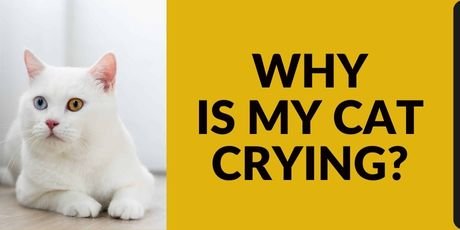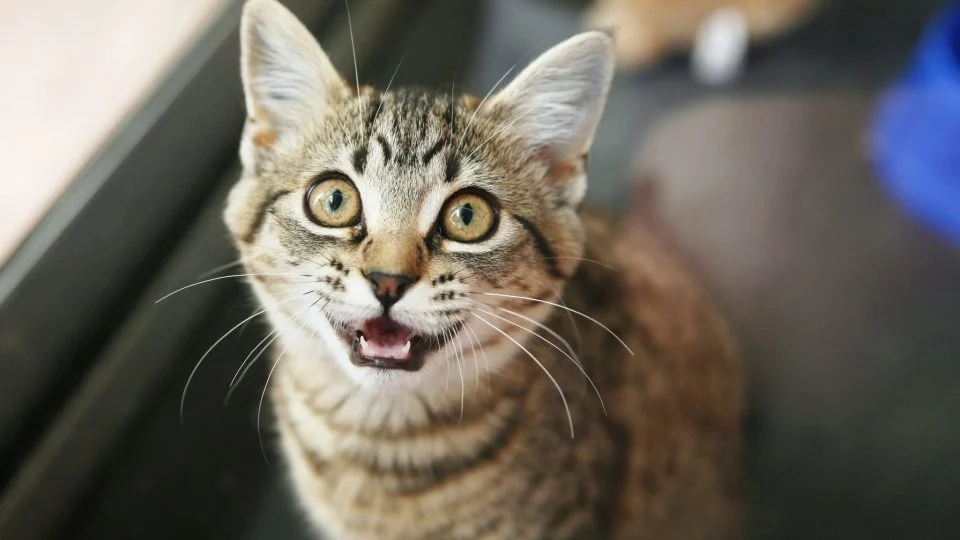As a pet owner, I’ve often pondered why my cat meows non-stop at certain times. It’s a challenging task to figure out what each meow sound signifies. But through personal experience and some expertise, I’ve learned that when a cat is meowing excessively, it’s their way of communicating something specific. Unlike adults, cats have a unique vocal language designed to interact with humans.
Have you ever noticed your cat meowing at you as if saying, “Hello, good to see you”? It’s quite endearing, but it can be different when the meows become persistent. The reasons a cat cries or meows incessantly can vary. They might be hungry, afraid, sick, or simply in need of attention and love. Each meow can be drastically different from the last, indicating different needs or emotions.
When your cat is meowing non-stop, it might be an issue that requires more attention. It could be a sign that they are in pain. In such cases, consulting a veterinarian is crucial. Through this article, we hope to help you find out the possible causes behind your cat’s vocalizations.
Why is My Cat Meowing Non-Stop?
In my journey as a pet owner, understanding why my cat is constantly crying or meowing non-stop has been both fascinating and perplexing. There’s a plethora of explanations for this behavior. Often, these persistent meows are a sign that they are sick or ill. Cats, being instinctively stoic, might only show their discomfort through vocalizations. It’s a subtle, yet crucial signal for us to tune into.
However, attention seeking is also one of the primary reasons behind this incessant meowing. Cats are social creatures and, contrary to popular belief, they do require regular interaction with their human companions. When they feel neglected or crave companionship, their cries become their language of expression.

They Feel Fear or Threatened
As a longtime cat owner, I’ve noticed a significant change in behavior when my cat feels fear or threatened. They don’t just meow; they often cry, cower, or hide in a corner. This reaction can be triggered by a thunderstorm, fireworks, or other loud noises from outside the house. It’s a genuinely uncontrollable response to what they perceive as a threat.
Interestingly, the introduction of a new animal, be it another cat or a dog, can also make them feel threatened. Cats are territorial by nature, and sharing their space can make them feel intimidated. This is especially true if the introduction to the new animal isn’t handled with care. They meow constantly, a vocal manifestation of their discomfort and unease. Understanding and addressing these fears is crucial for their wellbeing.
They Want Food
In my experience with feline companions, your cat crying as someone enters the kitchen is a classic sign of them wanting to eat, even when it’s not mealtime. This persistent behavior often looks like begging for food or treats. However, it’s important to do not feed them each time they meow for it. Instead, train them to be quiet before giving them their meal. This way, they learn that they get food only when they’re calm and not crying for it. This approach not only maintains their health but also reinforces good behavior, ensuring they don’t develop the habit of constant crying for food.
Also Read: Why Your Cat is Sneezing?
They Are Getting Older
Dealing with cats as they get older, I’ve observed a notable change in their behavior. They may experience mental dysfunction, leading to confusion and feelings of being uneasy or unsafe. This uncertainty can cause them to cry more often, especially at night, a possible sign of feline cognitive dysfunction syndrome. This change can start as their eyesight and hearing deteriorate, making them disoriented. They might forget the layout of the house and cry out for help. To assist, I install a nightlight to help see better and provide a heated bed to alleviate pain, especially if they have arthritis, a common issue in older cats. It’s also crucial to see the vet to rule out other medical problems.
They Are Greeting You
Having been away from the house for all day, moving through different rooms, I’ve observed my cat become visibly excited to see you upon return. This is their way of wanting to greet you, often accompanied by a warmly, welcoming meow. Sometimes, they might even meow a few times as if to say they’ve missed you. Cats, being vocal creatures, use their meows as a way of conveying feelings and expressions. They feel comfortable enough to talk to you, sharing what they’re thinking and feeling. The trick is to decipher the different meows; each one carries a unique message, whether it’s a greeting, a sign of hunger, or simply a desire for some cuddles. Understanding these vocal expressions deepens the bond between you and your feline friend.
What Do You Do When Your Cat Doesn’t Stop Meowing?
In my journey with a feline companion, I’ve learned a few solutions for handling an overly vocal cat. It’s a delicate balance between understanding and tough love. First, I try to comprehend the reason behind the constant meowing. Is it hunger, fear, or a need for attention? Once the cause is identified, I handle the situation accordingly.
No Food When it’s Not Time to Eat
In addressing my cat’s crying for food or treats when it’s not time to eat, I’ve adopted a firm yet caring approach. It’s crucial to ignore their pleas outside the designated meal or treat times. By doing so, they eventually become quiet and learn the routine of feeding time. The primary reason for this strict schedule is their health. Cats can easily become obese or overfed if given food every time they cry for it. Establishing and adhering to set feeding times is not just about discipline; it’s about ensuring the long-term well-being and health of our beloved feline friends.
Play Time before Bedtime
Dealing with a cat crying at night and disrupting sleep has led me to a simple yet effective strategy play time before bedtime. It’s a known fact that cats who sleep all day tend to be up to no good at nighttime, often crying loudly outside the bedroom door. To prevent this, I ensure they are sufficiently worn out by engaging them in interactive playtime just before bed. This routine not only curbs their nocturnal activities but also strengthens the bond between pet and owner, making for a more harmonious household.
Is Their Litter Box Clean?
A common yet often overlooked reason for a cat crying can be linked to the state of their litter box. Cats inherently detest a dirty litter box and may take offense if it’s not pristine. From my experience, ensuring a clean litter box is as crucial as providing food and water. They view their bathroom space with great importance, and a neglected litter box can lead to them expressing their dissatisfaction vocally. Therefore, it’s essential to maintain a clean environment for them, which involves cleaning their litter box daily. This simple yet vital task not only keeps your cat happy but also maintains a hygienic home environment.
The Meows Don’t Lie
As a cat owner, I’ve learned that low pitched, painful sounding cries are a sign that your cat might be in pain. When your cat exhibits this kind of vocalization, it’s important to take them to the vet as soon as possible. Such cries are concerning, especially if your cat will not stop crying. They’re trying to communicate something vital to their well-being. This experience taught me to always be attentive to the different sounds my cat makes, as they often convey crucial information about their health and emotional state.

Why is My Cat Crying? 4 Possible Causes
Your Cat May Be Crying for Attention
Even a well-attended cat might occasionally cry for attention. This crying is often accompanied by other bids for connection, such as rubbing against your legs, crawling into your lap, or head butting. It’s important to notice these behaviors. Despite being relatively low-maintenance pets, cats still have needs for daily enrichment through play and affection. If you find your cat consistently seeking attention, it might be time to reconsider your schedule and dedicate additional time to your feline friend. Understanding and responding to their needs can significantly reduce their vocal pleas for attention.
Also Read: Why is My Cats Stomach Bloated and Hard?
A Cat May Cry to Go Outside
While cats are safer indoors, being descended from wild animals, they still feel the call of the wild. Many indoor cats may cry or meow in an effort to be let outdoors. This desire is particularly focused during certain times or when they are close to a door or plant themselves by a window. They may vocalize at length, indicating this as a cause of your cat’s crying. These instances reveal their innate curiosity and desire for the outdoor environment, a stark contrast to their usually safe and controlled indoor setting. Understanding and acknowledging this instinctual behavior is crucial in addressing their cries to explore the outside world.
Crying Can Be a Stress Signal in Cats
Crying is often a stress signal in cats. It communicates underlying stress or anxiety. A normally moody cat may start to meow excessively when feeling discomfort or being in an uncomfortable situation. The increase in meowing can be a clear indicator of stress, and identifying the cause is crucial. Common stressors include new environments, new people, or changes in their routine. An investigation into these potential causes is necessary, and sometimes seeking help from a veterinarian is essential to determine the exact reason for this stressed behavior. Understanding and addressing these issues can significantly improve your cat’s wellbeing.
Cats Will Sometimes Cry Because of Illness or Pain
While most of the time, a cat’s crying is unrelated to a serious issue, there are exceptions where it indicates something more concerning. If your cat seems to be in discomfort, vocalizing more than usual, it could be a sign of a serious issue such as kidney issues, thyroid problems, or dental issues. Although somewhat rare, these medical conditions can cause a cat to cry excessively. Cats are naturally stoic and tend to hide pain, so their crying might be one of the few outward signs of a health issue. It’s crucial to take them to a veterinarian for a thorough examination. If you can’t find another reason for their distress through a process of elimination, it’s important to pursue appropriate care to ensure their wellbeing.
Why is My Cat Crying? How to Decipher Cat Cries
Cats, unlike dogs, have over a hundred different vocalizations, ranging from purring when they’re relaxed to high-pitched meows when stressed. To tell whether your cat’s cry is a sign of a serious concern or simply demanding attention, it’s essential to understand the emotional differences in cat cries. For instance, caterwauling or yowling may indicate distress or health issues, whereas regular meowing might just be their way of seeking attention. The science behind cat tears is also intriguing, as cats don’t typically shed tears in the same way humans do. Learning to identify the root of the cry is key in both preventing and stopping distress. This understanding can greatly enhance the bond between you and your cat, ensuring their needs are met and their well-being is maintained.
Why Do Cat’s Cry if Not to Show Emotion?
Watery eyes in cats are often mistaken for sadness or sorrow, but their vocalizations, particularly the uniquely sounding, high-pitched meow, are not always expressions of unhappiness. In fact, meowing is a vocalization primarily aimed at humans. While kittens meow to communicate with their mothers, as a cat ages, their meows evolve to communicate with humans. Scientists believe this behavior emulates babies crying, as a higher pitched and higher meow creates a sense of urgency for humans to solve the issue.
The reasons a cat may vocalize are numerous and not always food related. They might call for warmth, attention, affection, or playtime. Different ages, breeds, and personalities can also impact how they cry out their demands. Newborn kittens, born without hearing or sight, cry out for food and warmth in the first couple of months, while adult cats might have more common reasons like litter box maintenance. Understanding these nuances in cat communication can greatly enhance our ability to meet their needs.
Some other reasons that can cause a cat to audibly cry are:
- Being in season, neuter, spay, cat, as soon as possible.
- Fighting, outdoor cat, fights, other cats.
- Illness, suffering, haven’t picked up, discomfort, pain.
- Anxiety, sudden changes, routine, environment, family, impact, cat.
- FCD, dementia, older cats, common factor, increase vocalizations.
- Blindness, deafness, disoriented, cry out, help, disability.
According to the ASPCA, older cats may develop a condition known as feline cognitive dysfunction (FCD). This condition leads to disorientation, confusion, loss of motor and cognitive capabilities, and notably, increased vocalizations or cat cries.
Also Read: How to Tell If you’re Cat Has Whisker Fatigue?
Caterwauling and Yowling
In the world of cat communication, caterwauling and yowling stand out. These forms of intense vocalization are a mix of whining and meowing, but more pronounced and melodic. Unlike a typical meow, which is generally aimed at humans, yowling or caterwauling can indicate deeper issues like stress, pain, or anxiety. Certain breeds, like the Siamese, are more prone to vocalize in this manner. It’s important to note that yowling or caterwauling can be a cat’s way of getting attention or communicating something more serious. If your cat suddenly starts yowling or caterwauling out of the blue when it normally communicates quite differently, it might be a good idea to schedule a vet visit to rule out any serious underlying issues.
Cry Embedded in a Purr
Professor Karen McComb, a specialist in Animal Behaviour and Cognition at Sussex, has researched how cats can embed a low-pitch purr with a high-pitch signal, effectively crying out for food. This combination of delight and an urgent cry is often hard to ignore, particularly when it comes from a hungry cat. Professor McComb explains that felines can produce these purrs by vibrating muscles near their vocal cords, and deliberately voice out a high-pitch sound to show urgency and catch humans’ attention. This behavior is purposefully designed to interact with humans and works effectively in communicating their needs.
Conclusion
Understanding the varied reasons behind a cat’s cry is a journey into their complex emotional and communicative world. From expressing basic needs like hunger to more profound issues such as pain, anxiety, or the onset of age-related ailments, each cry or meow is a window into their well-being. As cat owners, it’s our responsibility to interpret these vocal cues with empathy and attentiveness. Recognizing and responding to these signals not only alleviates their distress but also deepens the bond we share with our feline companions. By tuning into their unique language and providing them with the care and understanding they require, we ensure a harmonious and loving relationship with these incredible creatures.
People Are Also Interested In:
What to do if my cat is crying tears?
Seeing tears running down your cat’s face can be alarming. It might indicate blocked tear ducts. If you notice tears from your cat’s eyes, it’s wise to consult a veterinarian to address the underlying issue.
Why is my cat meowing so much all of a sudden?
Have you ever noticed your cat meowing more than usual and wondered, “Why is my cat meowing so much all of a sudden?” This increase in vocalization often signals that your cat is stressed. The arrival of a new pet or baby, a recent move, or any changes in the home can lead to this behavior. Even illness or the loss of a loved one can make your cat a more frequent talker. It’s important to discover the root cause of this stressing and help your pet adjust to these changes.
Also Read: What is a Cats Average Lifespan?
How do cats show pain?
Cats often hide their pain, but as a keen observer, you might notice subtle changes in their facial expression. Your cat might squint or close their eyes, have ears that are flattened or pressed to the sides, and their mouth, nose, and cheeks may appear tenser and more compressed.
Why my cat is crying at night?
If your cat is crying at night, they might be feeling bored, unstimulated, or lonely. Sometimes, they just want to go outside. If the crying persists despite adequate play time, it could be a sign of thyroid disease or kidney disease.







